九情态动词
中考英语语法(九) 系动词和情态动词

3.must的用法 (1)must 意为“必须,一定,准是”,表示说话人认为必须 做某事,命令、要求别人做某事以及对某事的肯定推测。 【注意】 must 和 have to 的区别: must 表示说话人的主观 意愿;have to 表示客观需要。 I must do my homework first. 我必须先做家庭作业。
考点2
情态动词
情态动词表示说话人对某一动作或状态的态度,表示“ 可能”、“应当”、“必要”等含义,但其本身词义不完 全,不能独立作谓语,必须和动词原形连用。情态动词没 有人称和数的变化。其否定形式一般是在情态动词后加 not (have to除外)。情态动词数量不多,但用途广泛,主 要 有 can(could), may(might), must, need, shall(should), will(would)等。
更委婉。 Will you have a little soup? 你要不要喝点儿汤?
语法互动(九) 系动词和情态动词
7.归纳:情态动词表推测的用法
It is raining hard outside; I ________ have to stay at home.
外面雨下得很大,我不得不待在家里。
语法互动(九) 系动词和情态动词
(2)回答must提问的答语
①肯定回答:Yes,…must.
—Must I go home now?我必须现在回家吗? —Yes, you must. 是的,你必须现在回家。 ②否定回答:No,…needn't./No,…don't/doesn't have to. —Must I go home now? 我必须现在回家吗? —No, you____________________ needn't/don't have to . 不,你不必。
通用版九年级英语情态动词复习
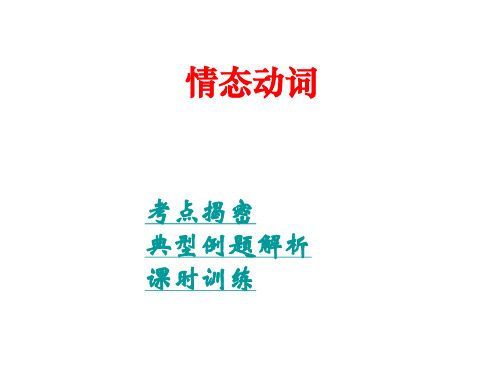
A.Must B.Shall C.Will D.Would
2.Go and ask Mr Liu.He ____A_____tell you.
A.may B.can C.would D.could
3.____B_____you please tell me the time please?
A.Shall B.Will C.May D.Might
A.Will B.Could C.Must D.Would
➢ 课时训练
6.He said Kate __(B_)__come to the party.But I don't think so.
A.could
B.might
C.need
D.must
7.—Need I do my lessons right now?
A.don't
B.can't C.won't
D.didn't
• --May I put my bike here?(2004) --No, you___. You should put it over there. A.couldn’t B.needn’t C.mustn’t D.won’t
• Cars, buses and bikes ______stop when the traffic light is red.(2005) A. can B. must C. may D. need
B.need
C.would
D.must
➢ 典型例题解析
【例4】 The boy said he had to speak English in class,
but he B speak it after class.
专题九情态动词(new)Model Verbs
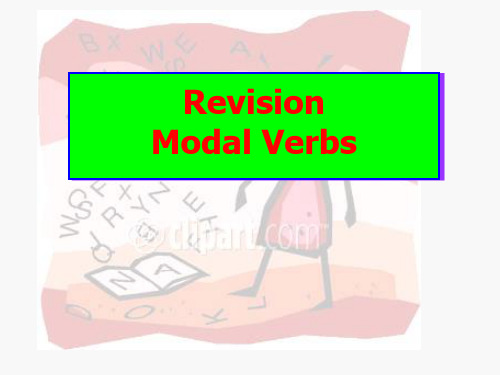
9.表猜测语气的反意疑问句的构成
He must be reading,________? isn’t he
What he said can’t be true,____________? is it
He must have gone over the article, __________? hasn’t he
Can this news be true? 的态度(主要用于否定句, How can you be so foolish? 疑问句和感叹句中)” (19)
can/could:
can never/can’t……too表示“无论怎样…也 不过分”,“越…越好” 。
You can’t be too careful 你过马路的时候再小心也不为过。 while crossing the road.
We should be strict with ourselves. 表劝告和建议“应该”
They should have arrived by two o’clock. 表推测,“可能,应该” You are mistaken, I should say. 用于第一人称,表示说话人的一种谦逊,客气,委婉
may 和can
• A computer _______ think for itself; it must be told what to do. • A. can’t B. couldn’t • C. may not D. might not 表客观“可能” 表主观“可能”
A
•may ______________ can____________ 不可能 可能不 •cannot___________ may not__________ Her grandpa _________ well be over 100. may/might I __________ as well start at once. may/might
专题九 情态动词(共12张PPT)

第2页,共12页。
情态动词 could
must should have to
ห้องสมุดไป่ตู้
意义及用法
例句
can的过去式, 意为“能,会”,
Lang Lang could play the piano well when he was
表示过去的能力。
young. 郎朗小的时候钢琴就
弹得很好。
Could I have a cup of tea?
意为“不可能”,表示否定推测。
边那个人不可能是吉姆。他
出国了。
意为“禁止, 不允许”, 不能用来 You mustn’t play soccer on
the street. 你不准在街道上踢
表示推测。
足球。
第7页,共12页。
考点小练
1.— A you tell me the differences between these two photos?
意为“不得不”, 多表示客观需 要。
The children have to get up early to catch the first bus. 孩子们为了赶第一趟公共汽
车不得不早起。
第3页,共12页。
need(n‘t) had better
(not) may
might
意为“需要(不必)”, 多用于 You needn’t say sorry to me.
用法
例句
用于强调客观需要, 意为“必须, We’ll have to ask Mr. Zhang.
不得不”。
我们必须问问张老师。
◆ can’t与mustn’t的区别
情态动词 can‘t
超级全的情态动词所有整理
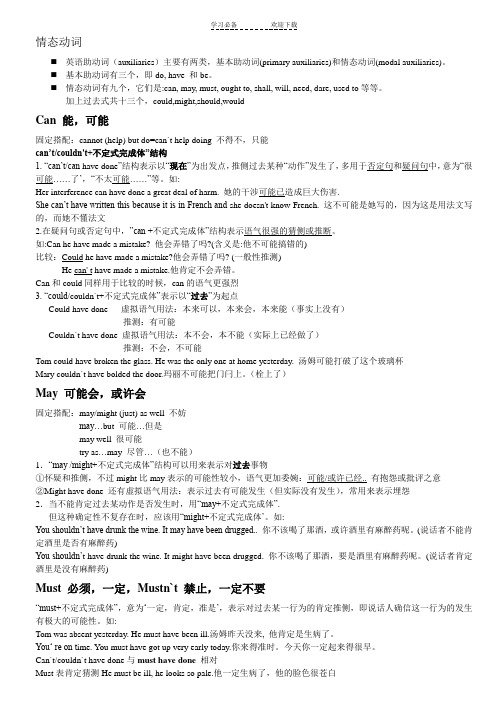
情态动词⏹英语助动词(auxiliaries)主要有两类,基本助动词(primary auxiliaries)和情态动词(modal auxiliaries)。
⏹基本助动词有三个,即do, have 和be。
⏹情态动词有九个,它们是:can, may, must, ought to, shall, will, need, dare, used to等等。
加上过去式共十三个,could,might,should,wouldCan 能,可能固定搭配:cannot (help) but do=can`t help doing 不得不,只能can’t/couldn't+不定式完成体”结构1. “can’t/can have done”结构表示以“现在”为出发点,推侧过去某种“动作”发生了,多用于否定句和疑问句中,意为“很可能……了’,“不太可能……”等。
如:Her interference can have done a great deal of harm. 她的干涉可能已造成巨大伤害.She can’t have written this because it is in French and she doesn't know French. 这不可能是她写的,因为这是用法文写的,而她不懂法文2.在疑问句或否定句中,”can +不定式完成体”结构表示语气很强的猜侧或推断。
如:Can he have made a mistake? 他会弄错了吗?(含义是:他不可能搞错的)比较:Could he have made a mistake?他会弄错了吗? (一般性推测)He can' t have made a mistake.他肯定不会弄错。
Can和could同样用于比较的时候,can的语气更强烈3. “could/couldn`t+不定式完成体”表示以“过去”为起点Could have done 虚拟语气用法:本来可以,本来会,本来能(事实上没有)推测:有可能Couldn`t have done 虚拟语气用法:本不会,本不能(实际上已经做了)推测:不会,不可能Tom could have broken the glass. He was the only one at home yesterday. 汤姆可能打破了这个玻璃杯Mary couldn`t have bolded the door.玛丽不可能把门闩上。
人教版英语九年级全册Unit4(难点透视):情态动词would和used to的用法区别

情态动词would和used to的用法区别1. would 和used to都表示过去的习惯行为,意思为:过去常常。
would 表示过去某时间的意志、愿望和决心。
如:He would come to have a chat with us when he was free.他有空时,常会过来跟我们聊天He used to live in a cottage near the river. 他过去常住在河边的一座小木房里。
2. would 往往强调过去的一种可能性,而不暗示现在的情况;而used to强调过去常这样干,而现在不干了, 强调今惜对比。
如:He would sit there alone, thinking. 他会独自一人坐在那儿思考。
He used to swim in the river in summer. 夏天他常常在这条河里游泳。
3. would 作will的过去式,表示过去的一种意愿或将要做的事情,意思为:将会。
而used to无此意义。
如:People would go to ask him for advice when they came into trouble. 人们碰到麻烦事,就会去问他解决的办法。
4. would有时也可用来指现在,表示一种委婉、客气的请求,对于用它来提问题的回答,须用will,不能用would。
而used to无此意义及用法。
如:Would you please help me with this case? 请帮助我提一下这个箱子好吗?Yes, I’d like to. / I will. 好,我非常乐意。
5. would一般接表示动作的动词,不能与表示状态或情感、意识方面的词连用,而used to无此限制。
如:He would get here at eight. 他在八点会到这儿来。
He used to be / get here at eight. 他过去常在八点来这儿。
九年级英语情态动词教案
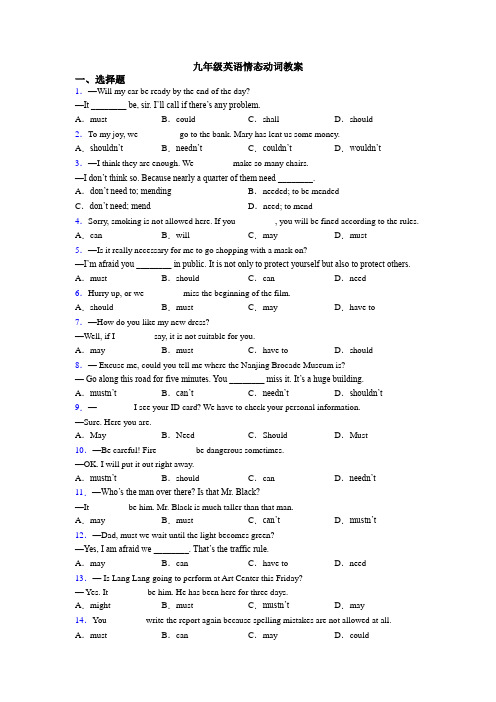
九年级英语情态动词教案一、选择题1.—Will my car be ready by the end of the day?—It ________ be, sir. I’ll call if there’s any problem.A.must B.could C.shall D.should2.To my joy, we_________ go to the bank. Mary has lent us some money.A.shouldn’t B.needn’t C.couldn’t D.wouldn’t3.—I think they are enough. We ________ make so many chairs.—I don’t think so. Because nearly a quarter of them need ________.A.don’t need to; mending B.needed; to be mendedC.don’t need; mend D.need; to mend4.Sorry, smoking is not allowed here. If you ________ , you will be fined according to the rules. A.can B.will C.may D.must5.—Is it really necessary for me to go shopping with a mask on?—I’m afraid you ________ in public. It is not only to protect yourself but also to protect others. A.must B.should C.can D.need6.Hurry up, or we ________ miss the beginning of the film.A.should B.must C.may D.have to 7.—How do you like my new dress?—Well, if I ________ say, it is not suitable for you.A.may B.must C.have to D.should8.— Excuse me, could you tell me where the Nanjing Brocade Museum is?—Go along this road for five minutes. You ________ miss it. It’s a huge building. A.mustn’t B.can’t C.needn’t D.shouldn’t9.—________ I see your ID card? We have to check your personal information.—Sure. Here you are.A.May B.Need C.Should D.Must10.—Be careful! Fire ________ be dangerous sometimes.—OK. I will put it out right away.A.mustn’t B.should C.can D.needn’t 11.—Who’s the man over there? Is that Mr. Black?—It ________ be him. Mr. Black is much taller than that man.A.may B.must C.can’t D.mustn’t 12.—Dad, must we wait until the light becomes green?—Yes, I am afraid we ________. That’s the traffic rule.A.may B.can C.have to D.need13.— Is Lang Lang going to perform at Art Center this Friday?— Yes. It ________ be him. He has been here for three days.A.might B.must C.mustn’t D.may14.You ________ write the report again because spelling mistakes are not allowed at all. A.must B.can C.may D.could15.You'd better __________ hard from now on, __________ you will fail the exam. A.work; and B.working; or C.working; and D.work; or 16.— Mom, must I clean my room now?— No, you ________. You can do it after dinner.A.needn’t B.mustn’t C.shouldn’t D.can’t17.A lot of online resources ________ be used either by teachers at school or parents at home. A.can B.should C.need D.must 18.—Amy, I hear you've got many foreign coins._______ I have a look?—Of course, I'll fetch them for you.A.May B.MustC.Should D.Need19.You ______ pay too much attention to your pronunciation, as it is so important in the oral (口头的) test.A.shouldn’t B.mustn’t C.can’t D.needn’t 20.—Mum, why do I have to wear a mask before entering the supermarket?—For your health and safety, you ________ be too careful.A.shouldn’t B.can’t C.must n’t D.needn’t 21.Look at the floor, Tom! ________ you watch TV while having a meal?A.Should B.Could C.Must D.May 22.According to the rule, used batteries ________ be dropped in the red bin for harmful wastes. A.may B.would C.should D.might23.You _________ smoke here! Look at the sign. It says "No smoking".A.needn't B.mustn't C.can D.may24.— Listen! Tom ________ be listening to the music while doing his homework.—Let’s go upstairs to remind him to turn it off.A.should B.could C.would D.must 25.—Suzy described every detail of the accident just now.—Her memory ________ be completely back.A.shall B.need C.must D.could26.—Is that Mr Zhou?—It ________ be him. He has gone to Beijing.A.can B.may C.can’t D.shouldn’t 27.Most young people like shopping online because they ________ spend much time going from shop to shop.A.needn’t B.can’t C.mustn’t D.shouldn’t 28.— Mum, why do I have to wash hands so many times a day?—You ________ be too careful, for your health.A.can’t B.mustn’t C.may not D.needn’t 29.You ________ drive after drinking alcohol(酒). It’s against the law.A.mustn’t B.needn’t C.couldn’t D.wouldn’t30.—Is it usually warm in Yancheng in May?—Yes. But it _______ be rather cold sometimes.A.must B.should C.would D.can31.A hard-working man ________ become a great scientist, but a great scientist ________ be a hard-working man.A.can’t; can B.may not; must C.can’t; must D.may not; can 32.—Excuse me. I haven’t finished reading the book yet. May I keep it a bit longer?— Sorry, you ________. You must return it on time.A.needn’t B.can’t C.won’t D.shouldn’t 33.Sometimes smiles ________ be false, hiding other feelings like anger, fear or worry. A.should B.would C.must D.can34.You’ve got an A in the maths test again. You ________ be good at it.A.can B.may C.must D.should 35.—Could you tell me how to renew the library books?—With pleasure. You ________ come to our desk every time. It’s easier to renew them online. A.can’t B.mustn’t C.needn’t D.shouldn’t 36.For the safety of the passengers, objects like guns ________ be carried on board.A.may not B.needn’t C.might not D.mustn’t 37.—The article says that a person’s animal sign decides his personality.—You ________ read it for fun, but don’t believe in that.A.can B.must C.shouldn’t D.needn’t 38.—Mum, I bought some strawberries on my way home.—Oh, you’re so sweet. But the strawberries ________ be put into the fridge for freshness. A.must B.can C.may D.need39.—In China, many students have to stay up late to do their homework.—No worries. The government has realized the problem. I’m sure there ________ be good news soon.A.can B.should C.must D.need40.—In China, many parents complain that their children have to stay up late to do the homework.—Don’t worry. The government has realized the problem. I’m s ure there ________ be good news soon.A.can B.should C.need D.must【参考答案】一、选择题1.D解析:D【详解】句意:——我的车今天能修好吗?——应该能,先生,如果有什么问题我会打电话给你。
初中英语:情态动词

初中英语:情态动词介绍:情态动词是英语中的一个重要语法点,它们可以用来表示可能性、必要性、责任、建议等等。
在英语口语中,情态动词的使用非常频繁,但是不同的情态动词的用法又各有不同,因此,我们有必要系统地学习情态动词的用法。
本文将为大家详细介绍情态动词的用法,并提供大量的练习题和答案,帮助大家掌握情态动词的用法,让你的英语口语更加流利。
一、情态动词的概念情态动词是指表示说话人对所说内容态度、说话人主观意愿、能力、建议、命令、禁止等的动词。
常用的情态动词有can、could、may、might、must、shall、should、will、would 等九个词。
二、情态动词的用法1.表示能力、许可、建议、命令、禁止等情况1) Can / CouldCan 表示现在或未来有能力做某事;Could 表示过去或未来有能力做某事,或表示委婉语气。
如:I can swim.(我会游泳。
)Could you open the window?(你能帮忙把窗户打开吗?)2) May / MightMay 表示有可能;Might 表示有可能性的弱化。
如:It may rain tomorrow.(明天可能会下雨。
)I might go to the party.(我可能去参加聚会。
)3) MustMust 表示必须,有义务或责任做某事。
如:You must wear a seat belt in the car.(在车上必须系安全带。
)I must finish my homework tonight.(我今晚必须完成作业。
)4) Shall / ShouldShall 表示说话人的意愿,用于提出建议或征求意见;Should 表示应该做某事,并且有义务去做。
如:Shall we go to the cinema tonight?(今晚我们去看电影好吗?)You should stop smoking.(你应该戒烟。
)5) Will / WouldWill 表示意愿、意图和承诺;Would 表示委婉请求和含蓄的建议。
专题九 情态动词can和would

专题九情态动词can和would一、情态动词:表示说话人对有关行为或事物的态度和看法,认为其可能、应该或必要等。
情态动词后面加动词原形。
情态动词无人称和数的变化,情态动词后面跟的动词需用原形,否定式构成是在情态动词后面加"not"。
二、can,表示能会,后面接动词原形,如:I can sing. 我会唱歌。
She can dance. 她能跳舞。
(1)有关can的句型:a.肯定句:主语+can+动词原型1.Lingling can ride a horse. 玲玲会骑马。
2.He can speak Chinese.他会说中文。
3.My father can play table tennis.我的爸爸会打乒乓球。
b.否定句:主语+can+not+动词原形1. Lingling can’t ride a horse.2.3.c.一般疑问句及回答:Can+主语+动词原形1.Can Lingling ride a horse? Yes,she can.2.3.d.特殊疑问句:特殊疑问词+can+主语+动词原形1. What can you do? 你会做什么?2. How many birds can you see? 你能看见多少只鸟?3. Who can help me? 谁能帮助我?你还能造出有关can的特殊疑问句吗?练习:1、Can you play ____piano? A、a B、an C、the2、Can you dance? yes, I ____. A、do B、can C、can’t3、Can he Write English? No,he ____ A、can B、can’t C、does4、I __ ride a bike ,but I ____drive a car. A、can , can B、can’t , can’t C、can, can’t5、She can _____basketball . A、play B、playing C、plays三、would是一个情态动词,意思是“愿意”,其后接动词原形;eg: I would stay at home.我愿意呆在家里。
九年级英语情态动词must和haveto辨析单选题40题
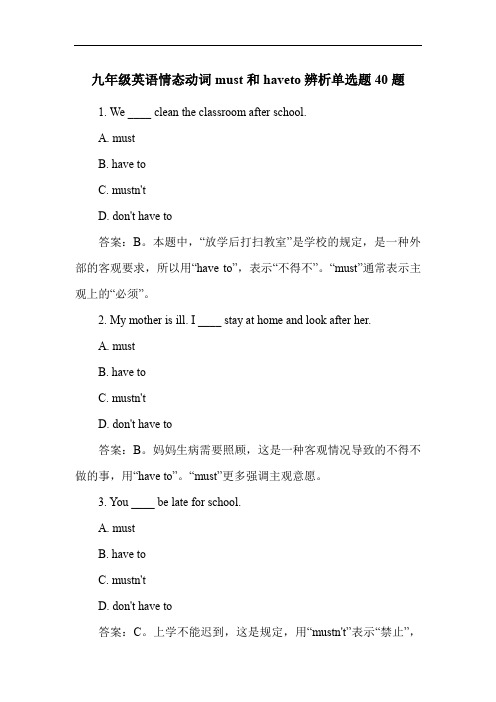
九年级英语情态动词must和haveto辨析单选题40题1. We ____ clean the classroom after school.A. mustB. have toC. mustn'tD. don't have to答案:B。
本题中,“放学后打扫教室”是学校的规定,是一种外部的客观要求,所以用“have to”,表示“不得不”。
“must”通常表示主观上的“必须”。
2. My mother is ill. I ____ stay at home and look after her.A. mustB. have toC. mustn'tD. don't have to答案:B。
妈妈生病需要照顾,这是一种客观情况导致的不得不做的事,用“have to”。
“must”更多强调主观意愿。
3. You ____ be late for school.A. mustB. have toC. mustn'tD. don't have to答案:C。
上学不能迟到,这是规定,用“mustn't”表示“禁止”,“must”是“必须”,“have to”是“不得不”,“don't have to”是“不必”,都不符合题意。
4. We ____ obey the traffic rules.A. mustB. have toC. mustn'tD. don't have to答案:A。
遵守交通规则是我们应该主动去做的,是主观上的“必须”,用“must”。
5. The teacher said we ____ finish our homework on time.A. mustB. have toC. mustn'tD. don't have to答案:A。
老师要求按时完成作业,这是一种主观上的要求,用“must”。
专题九 情态动词和虚拟语气
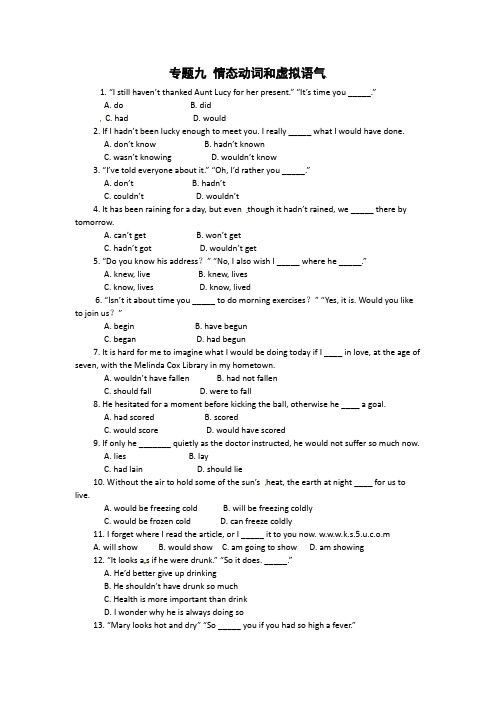
专题九情态动词和虚拟语气1. “I still haven’t thanked Aunt Lucy for her present.” “It’s time you _____.”A. doB. didC. hadD. would2. If I hadn’t been lucky enough to meet you. I really _____ wh at I would have done.A. don’t knowB. hadn’t knownC. wasn’t knowingD. wouldn’t know3. “I’ve told everyone about it.” “Oh, I’d rather you _____.”A. don’tB. hadn’tC. could n’tD. wouldn’t4. It has been raining for a day, but even though it hadn’t rained, we _____ there by tomorrow.A. can’t getB. won’t getC. hadn’t gotD. wouldn’t get5. “Do you kn ow his address?” “No, I also wish I _____ where he _____.”A. knew, liveB. knew, livesC. know, livesD. know, lived6. “Isn’t it about time you _____ to do morning exercises?” “Yes, it is. Would you like to join us?”A. beginB. have begunC. beganD. had begun7. It is hard for me to imagine what I would be doing today if I ____ in love, at the age of seven, with the Melinda Cox Library in my hometown.A. wouldn’t have fallenB. had not fallenC. should fallD. were to fall8. He hesitated for a moment before kicking the ball, otherwise he ____ a goal.A. had scoredB. scoredC. would scoreD. would have scored9. If only he _______ quietly as the doctor instructed, he would not suffer so much now.A. liesB. layC. had lainD. should lie10. With out the air to hold some of the sun’s heat, the earth at night ____ for us to live.A. would be freezing coldB. will be freezing coldlyC. would be frozen coldD. can freeze coldly11. I forget where I read the article, or I _____ it to you now. w.w.w.k.s.5.u.c.o.mA. will showB. would showC. am going to showD. am showing12. “It looks a s if he were drunk.” “So it does. _____.”A. He’d better give up drinkingB. He shouldn’t have drunk so muchC. Health is more important than drinkD. I wonder why he is always doing so13. “Mary looks hot and dry” “So _____ you if you had so high a fever.”A. doB. areC. willD. would14. “He will come tomorrow.” “But I’d rather he _____ the day after tomorrow.”A. will comeB. is comingC. cameD. had come15. All the doctors in the hospital insisted that he ____ badly wounded and that he ____ at once.A. should be; be operated onB. were; must be operated onC. was; should be operatedD. was; be operated on16. ______ smoking, he would not have got cancer in the lung.A. Was he given upB. Had he given up w.w.w.k.s.5.u.c.o.mC. Did he giveD. If he gave up17. “I still haven’t thanked Aunt Lucy for her present.” “It’s time you _____.”A. doB. didC. hadD. would18. “Do you know his address?” “No, I also wish I _____ where he _____.”A. knew, liveB. knew, lives w.w.w.k.s.5.u.c.o.mC. know, livesD. know, lived19. It is hard for me to imagine what I would be doing today if I ____ in love, at the age of seven, with the Melinda Cox Library in my hometown. w.w.w.k.s.5.u.c.o.mA. wouldn’t have fallenB. had not fallenC. should fallD. were to fall20. Without the air to hold some of the sun’s heat, the earth at night ____ for us to live.A. would be freezing coldB. will be freezing coldlyC. would be frozen coldD. can freeze coldly21.________ fired, your health care and other benefits will not be immediately cut off.A. Would you beB. Should you beC. Could you beD. Might you be22.You can’t imagine that a well-behaved gentleman _____ be so rude to a lady.A. mightB. needC. shouldD. would23.—Excuse me. But I want to use your computer to type a report.—You _____have my computer if you don’t take care of it .A. shan’tB. might notC. needn’tD. shouldn’t24. He _____ have completed his work; otherwise, he wouldn’t be enjoying himself by the seaside.A. shouldB. mustC. wouldn’tD. can’t25. I ______ have been more than six years old when the accident happened.A. shouldn’tB. couldn’tC. mustn’tD. needn’t26. There _____ be any difficulty about passing the road test since you have practiced a lot in the driving school.A. mustn’tB. shan’tC. shouldn’tD. needn’t27. I was on the highway when this car went past fol. Lowed by a police car. They______ at least 150 kilometers an hour.A. should have been doingB. must have been doingC. could have doneD. would have done28. —I’ve taken someone else’s green sweater by mistake.—It ______ Harry’s. He always wears green.A. has to beB. will beC. mustn’t beD. could be29. — Catherine, I have cleaned the room for you.— Thanks. You ______ it. I could manage it myself.A. needn’t doB. needn’t have doneC. mustn’t doD. shouldn’t have done30. —Lucy doesn’t mind lending you her dictionary.—She _______. I’ve already borrowed one.A. can’tB. mustn’tC. needn’tD. shouldn’t反思:与现在相反用过去式,与过去相反用完成式!。
语法专题九 情态动词和虚拟语气
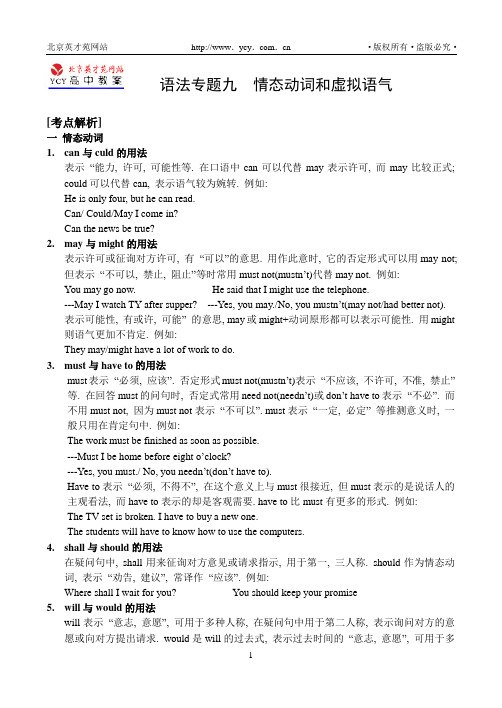
语法专题九情态动词和虚拟语气[考点解析]一情态动词1.can与culd的用法表示“能力, 许可, 可能性等. 在口语中can可以代替may表示许可, 而may比较正式;could可以代替can, 表示语气较为婉转. 例如:He is only four, but he can read.Can/ Could/May I come in?Can the news be true?2.may与might的用法表示许可或征询对方许可, 有“可以”的意思. 用作此意时, 它的否定形式可以用may not;但表示“不可以, 禁止, 阻止”等时常用must not(mustn’t)代替may not. 例如:You may go now. He said that I might use the telephone.---May I watch TY after supper? ---Yes, you may./No, you mustn’t(may not/had better not).表示可能性, 有或许, 可能”的意思, may或might+动词原形都可以表示可能性. 用might 则语气更加不肯定. 例如:They may/might have a lot of work to do.3.must与have to的用法must表示“必须, 应该”. 否定形式must not(mustn’t)表示“不应该, 不许可, 不准, 禁止”等. 在回答must的问句时, 否定式常用need not(needn’t)或don’t have to表示“不必”. 而不用must not, 因为must not表示“不可以”. must表示“一定, 必定”等推测意义时, 一般只用在肯定句中. 例如:The work must be finished as soon as possible.---Must I be home before eight o’clock?---Yes, you must./ No, you needn’t(don’t have to).Have to表示“必须, 不得不”, 在这个意义上与must很接近, 但must表示的是说话人的主观看法, 而have to表示的却是客观需要. have to比must有更多的形式. 例如:The TV set is broken. I have to buy a new one.The students will have to know how to use the computers.4.shall与should的用法在疑问句中, shall用来征询对方意见或请求指示, 用于第一, 三人称. should作为情态动词, 表示“劝告, 建议”, 常译作“应该”. 例如:Where shall I wait for you? You should keep your promise5.will与would的用法will表示“意志, 意愿”, 可用于多种人称, 在疑问句中用于第二人称, 表示询问对方的意愿或向对方提出请求. would是will的过去式, 表示过去时间的“意志, 意愿”, 可用于多种人称. 若表示说话人的意愿或向对方提出请求, 语气比will婉转, 指现在时间. 例如:I will tell you all about it. He won’t go with us.Would you like some coffee?6.need的用法用作情态动词时, need表示“敢; 敢于”, 主要用于疑问句, 否定句和条件从句中, 一般不用于肯定句. 例如:You needn’t come so early7.dare的用法dare用作情态动词时, 和need一样, 也是主要用于疑问句, 否定句和条件从句中. 例如: He daren’t speak English before such a crowd, dare he?8.ought to的用法ought to表示“应该” (与should同义, 只是语气稍重一些), 也可表示推测. 例如:You ought to take care of him. He ought to be home by now.ed to的用法表示过去的习惯动作或状态(现在已不复如此).例如:---Did you use to go there to see your brother? /Used you to go there to see your brother?---Yes, I did(used to). /No , I didn’t (usedn’t)10.had better的用法表示“最好(做……)”. 例如:We had better go now. Breakfast had better be eaten before 8 o’clock.情态动词用法归纳:二虚拟语气虚拟语气在虚拟条件中的运用(1)表示与现在事实完全相反的假设用以表示与现在事实相反的假设或现在实现可能性不大的情况. 条件从句用动词过去式(be 多用were), 主句用would/should/could/might+动词原形. 例如:If I were a bird, I could fly.如果我是一只鸟儿的话, 我就能飞了.(2)表示与过去事实完全相反的假设条件从句用had+过去分词, 主句用would/should/could/might+ have+过去分词. 例如:It we had started earlier, we should not have missed the train.如果我们早点出发, 就不会错过这列火车了.(3)表示与将来情形相反的假设或极少有可能实现的情况条件从句用动词过去式, should+动词原形, were to+动词原形, 主句动词用would/should/could/might+动词原形. 例如:If Professor Li should have time tomorrow, we could ask him questions.如果李教授明天有时间的话, 我们就可以问他问题了.书面语中, 上述三种时态的虚拟句中, 如果从句里含有should, had, were或其他助动词, 则可将从属连词if省去, 将助动词或情态动词放在句首形成部分倒装. 例如:Were he in your position, he’d have done the same.如果他在你的位置上, 他也会那么做的.2.错综时间虚拟句通常情况下, 在非真实条件句中主句和从句的谓语动词所指时间是一致的, 但有时也可能指不同的时间, 这时要根据上下文的意思采用不同的谓语动词形式, 例如;(1)If I were you, I would have taken his advice. (从句指现在, 主句指过去)如果我是你的话, 我就接纳他的建议.(2)If I had taken my raincoat with me this morning, I would not be wet now. (从句指过去, 主句指现在)如果今天早上带上雨衣的话, 我现在就不会淋湿了.3.含蓄条件句有时假设的情况并不以条件从句表示, 而是暗含在上下文中, 比如通过介词短语来表示. (1)But for your advice, I could not have done it so successfully.要是没有你的建议, 我就不会成功(2)The changes could not have taken place without the open-door policy.要是没有开放政策, 就没有这些变化.(3)I was so busy then, otherwise, I would have gone to help him.那时我太忙了, 否则我就去帮他了.4.虚拟语气在某些从句中的应用(1)在wish, suggest, order, demand, propose, command, request, require, insist, desire, urge动词的宾语从句以及would rather后, 要用“(should)+动词原形”来表示愿望, 建议, 命令, 要求等; 由上述动词派生或转化的名词的同位语从句或表语从句中也要用相应的虚拟形式.像suggestion, proposal, plan, motion, recommendation, demand, order, desire, request, requirement, insistence, advice, decision等词.(2)在It is/was+某些形容词+that从句的句型中, that从句中的谓语动词常用虚拟语气, 即“should+动词原形”表示惊奇, 遗憾, 怀疑, 不满等。
九年级英语情态动词完整归纳

九年级英语情态动词完整归纳一、初中英语情态动词1.—I take the magazine out of the reading room?—I'm sorry you.A. Could; couldn'tB. Must; couldn'tC. Will; can*tD. May; can't【答案】D【解析】【分析】句意:一一我可以把杂志带出阅览室吗?一一对不起,你不能.could 能,可以;must必须:w川将:may可以;can能,可以,can't不可以,不能.此处表示请求许可,用could或者may,由could或者may构成的一般疑问句,肯定答复用yes,主语+can,否认答复用sorry,主语+can't,结合选项,故答案选D“【点评】考查情态动词的辨析.注意理解句意,理解选项,根据语境,选出正确的答案.2.—Life is becoming convenient with the Internet.—That's true! Almost everything be done online.A. mustB. couldC. shouldD. can't【答案】B【解析】【分析】句意:一一生活正随着网络变得方便.一一那是真的.几乎所有的事情可以在网上完成.A 必须,B 可以,C 将,D 不能.Life is becoming convenient with the Internet.生活正随着网络变得方便,可知应该是很多事情可以在网上完成,应选【点评】考查情态动词.注意理解和掌握情态动词的不同用法.3.Look at the sign! It says “No Smoking!〞 You smoke here. It's dangerous.A. mustn'tB. ought not toC. needn'tD. don't have to【答案】A【解析】【分析】句意:看这个标志!上面写道"禁止吸烟!"你不能抽烟.这是危险的.A.mustn't 禁止,不允许;B.ought not to 不应该,不应当;C.needn't 不必;D.don't have to 不必.根据“N.Smoking!〞可知此处禁止吸烟,故答案为A.【点评】考查情态动词.掌握情态动词的意义和用法.4.Teenagers_allowed to drive .A. should not beB. should be notC. not should be【答案】A【解析】【分析】句意:年轻人不应该被允许驾车.Should是情态动词,其否认表达一般在在后面加副词not,应选A.【点评】此题考查含有情态动词的被动语态的否认形式.平时注意记忆情态动词的记忆和用法.5.—Where is Mom now?—I'm not sure. She be in the kitchen.A. shallB. mayC. needD. must【答案】B【解析】【分析】句意:一妈妈现在在哪里?一我不确定,她也许在厨房.A. shall将要:B. may 可以,可能:C. need需要;D. must必须,一定:根据I'm not sure可知是不确定:应选B»【点评】此题考查情态动词表推测的用法.6.—Who it be that is knocking at the door?—It be father, but I'm not sure.A. call; mustB. can; mayC. must; canD. may; must【答案】B【解析】【分析】句意:一一敲门的人可能是谁呢?一一他可能是父亲,但是我不确定. 第一空,can可能,表猜想用语疑问句形式,may是表可能;第二空,根据后面的but I'm not sure,可知表示不确定的猜想,应填may,应选B.【点评】此题考查情态动词辨析.先弄清每个情态动词的使用规那么.根据上下文的联系确定情态动词的使用.7.— I wonder if this smart phone is Mary's.— It belong to her. is totally different from this one.A. mustn't; HerB. can't; Her c. can't; Hers D. may; Hers 【答案】c【解析】【分析】句意:一一我想知道这个智能机是否是玛丽的.一一不可能属于她,她的和这个完全不同.情态动词表示推测时,用must表示"一定〞,用might, could表示“可能〞,用can't 表示"不可能".从句意看,这与她的完全不同,故不可能是她的,前面用can't o形容词性的物主代词后一定有一个被修饰的名词,名词性的物主代词后没有被其修饰的词,此题后没有被修饰的词,用名词性的物主代词,“她的":hers.应选C.8.As middle school students, we _follow the public rules wherever we go.A. wouldB. shouldC. mightD. could【答案】B【解析】【分析】句意:作为中学生,无论走到哪里我们应该遵守公共规章制度.would 将会,指将会发生的事情:should,应该,主要用于告诉某人应该做什么、给予忠告或加强语气.might,可能,事情发生的可能性:could,能,表示委婉语气;此处表示应该做的事情,应选B.【点评】此题考查情态动词辨析.根据上下文的联系确定所使用的情态动词.9.—He be in the classroomj think.—No, he be in the classroom. I saw him go home a minute ago.A. can; may notB. must; may notC. may; mustn'tD. may: can't【答案】D【解析】【分析】句意:一一我认为他可能在教室里.一一不,他肯定没有在教室里,我刚才看到他回家了.must,can (could) ,may (might)可以表示猜想,must表示肯定猜想,用于肯定句,肯定……一定……:can't表示否认猜想,肯定不......................... 另外can ( could ) ,may (might),表示可能性猜想,可能......根据I think,可知把握较小,根据I saw him go home a minute ago.可知第二句把握大,应选D.10.Shall we meet at the station at 7 am?---- In fact, we. The train until 9 a. m.A. mustn't; doesn't leaveB. mustn't; leavesC. needn't; won't leaveD. needn't; will leave【答案】C【解析】【分析】need,需要,否认式是needn't: must的含义是必须一定,其否认形式mustn't 表示禁止的含义.句意:我们上午七点在车站见而好吗?一一实际上,我们不必. 火车到上午九点钟才出发.结合语境可知后一空描述的是将要发生的动作,故用一般将来时态.选C.【点评】情态动词的考查是初中英语考查的重点,平时学习中一定要熟记这些词的根本词义及用法上的不同,注意其用法及在句子中表达语气的不同.测试中结合语境选择适宜答案.11.—you play tennis?—Yes, and I'm a good player.A. CanB. MayC. MustD. Should【答案】A【解析】【分析】句意:一一你会打网球吗?一一会,我是一名优秀的网球员.Can能,表示水平;may可以,表示允许;must必须,表示要求:should应该,表示建议;结合句意,此处表示水平,故用情态动词can,应选A.【点评】此题考查情态动词的用法.12.—Wow....another gift! What's in the box?—I'm not sure. It be a pair of sports shoes.A. mustB. mayC. will【答案】B【解析】【分析】句意:一一哇哦,另一个礼物!在盒子里面的是什么?一一我不确定, 它可能是一双运动鞋.A. must必须;B. may可能,表示没有把握的肯定推测:C. will将会.根据答语中的不确定可知这里应为可能,故答案为B.【点评】考查情态动词.掌握情态动词may表示推测的用法.13.—I think we need to sit down and have a talk. —I _________ agree more. Let*s take the bench over there.A. couldB. couldn'tC. shouldD. shouldn't【答案】B【解析】【分析】试题分析:句意:一一我认为我们需要坐下来谈一谈.一一我完全同意.我们到那边凳子上坐© I could agree more我可以同意更多的,I couldrVt agree我不同意I couldn't agree more,我完全同意I should agree more.应该同意更多,I shouldrVt agree more 我不应该同意更多.后句Let's take the bench over there.我们在那边的凳子上坐吧〕可以推测出,我同意,应选B'j14.You are supposed to bow when you meet someone from Korea.A. mustB. shouldC. wouldD. can【答案】B【解析】【分析】句意:当你遇到来自韩国的人时,你应该鞠躬.A. must必须,强调主观上的愿望;B. should应该,表示责任与义务:C. would要,将要:D. can能,会,表示能力.Be supposed to 表示"应该",应选B.【点评】此题考查情态动词词义辨析,以及must、should, would、can四个情态动词的词义和用法.15.Size and type do not matter — you do almost anything if you never give up.A. shouldB. mustC. needD. can【答案】D【解析】【分析】句意:大小和类型不重要一一如果你不放弃,你几乎可以做任何事.A. should 应该:B. must 必须;C. need 需要;D. can 可以,能:根据if you never give up,可知此处说你能做几乎任何事情,应选D.【点评】此题考查情态动词辨析.根据上下文的联系确定所使用的情态动词.16.—Some people don*t show their talents at the very beginning.—I agree. Even Einstein read until he was seven.A. can'tB. mustn'tC. couldn'tD. needn't【答案】c【解析】【分析】句意:一一一些人在一开始的时候没有表现处自己的才能.一一我同意.甚至爱迪生直到七岁时才会读书G can't不能:mustn^ 一定不会,禁止:couldn't不能:needn'to not...until...,直至U 才根据Some people don't show their talents at the very beginning.可知此处指爱迪生7岁才会读书,指才能,能做某事,根据he was seven ,可知句子时态是过去时,应选C. 【点评】此题考查情态动词辨析.根据上下文的联系确定句中所使用的情态动词.17.Harry's been driving all day --------he be tired.A. needB. canC. shallD. must【答案】D【解析】【分析】句意:哈利已经开了一整天车了一一他一定累了.根据句意可知,开了一整天车,所以推测他累是一定的.所以用情态动词must.应选D,18.—Kate, it's midnight! Why stay up so late?—I'd like to go to bed earlier, but the test paper ____ be handed in tomorrow morning.A. mayB. shouldC. canD. must【答案】D【解析】【分析】句意:Kate,都半夜了,你为什么熬夜到这么晚?我想要早一点睡觉, 但是这个试卷明天早上必须交上.may〞可以";should"应该":can"能,会,可能〞;must〞必须“.根据句意Kate熬夜到很晚,说明试卷明天必须交上,语气非常强,故应选D.【点评】考查情态动词辨析,区分may, should, can, must的含义和用法.19.—Is that boy Scott?—No, it _ be Scott. Scott is much taller.A. canB. can'tC. mustn't【答案】B【解析】【分析】句意:一一那个男孩是Scott吗?一一不,他不可能是Scott.. Scott个字高很多.A可能、可以:B不可能:C禁止.根据题干中Scott is much taller.可知斯科特更高,所以那个男孩不可能是斯科特,如表示对现在情况的否认推测,应用can"动词原形,故答案选B.【点评】考查情态动词,注意平时识记其用法,理解句意.20.The girl in the classroom be Mary. She called me from Beijing just now.A. mustn'tB. needn'tC. shouldn'tD. can't【答案】D【解析】【分析】句意:教室里的女孩不可能是玛丽.她刚刚从北京给我打的.A.不准,不允许,禁止;B.不必;C.不应该;D.不可能.后句句意可以堆测出玛丽不在教室,表示否定的推测,不可能,应选D.21.— Is that Mr. Green?—Impossible. He has gone to America. It_be him.A. couldB. mustC. can'tD. might【答案】c【解析】【分析】句意:一一那是格林先生吗?一一不可能,他去美国了.不可能是他. A.could可能,表示对目前情况作的可能的推测;可以,表示委婉的语气:B. must必须, 强调主观的愿望;一定,表示对目前作的肯定推测:C. can't不能,表示水平:不可能,表示否认的推测;D. might可能,表示可能的推测.根据句意,他去美国了,所以那不可能是格林先生.应选C.22.— What's the matter with Tom? He's been absent for two days.—Oh! He be ill. Let*s go and see him.A. needB. mightC. mustD. should【答案】c【解析】【分析】句意:一一汤姆怎么了?他已经缺席两天了.一一哦!他可能病了.我们去看看他吧.need需要,指有必要:might可能,表示推测语气,可能性很小:must 一定,表肯定推测:should应该,表建议.根据Let's go and see him.,可知推测汤姆生病了,去看看汤姆,表示肯定的推测,用must,应选C.【点评】考查情态动词辨析.根据上下文的联系确定所使用的情态动词.23.I'm sorry I_go now. My piano lesson will start in ten minutes.A. mustB. mightC. canD. could【答案】A【解析】【分析】句意:对不起,我得走:了.我的钢琴课十分钟后开始.A必须,表示责任:B可以,表示建议;C能够,表示水平或许可:D能够,表示许可.根据题干中的My piano lesson will start in ten minutes.提示可知,此句表示必须走了,应选A.【点评】考查情态动词的辨析.弄清每个情态动词的根本含义及用法,根据上下文语境确定正确的答案.24.—Must I go out to have dinner with you, Mum?—No, you ___ , my dear. You're free to make your own decision.A. shouldn'tB. mustn'tC. needn'tD. can't【答案】C【解析】【分析】句意:一一妈妈,我必须跟你出去吃饭吗?一一不,你不必,亲爱的. 你可以自由作出你的决定.问句是must构成的一般疑问句,根据no,可知是否认答复, must的否认回容许会使用needn'3故答案是C.【点评】考查情态动词neednl的用法,注意must构成的一般疑问句的否认答复.25.Please don't make so much noise. I hear the speaker very well.【答案】B【解析】【分析】句意:请不要发出那么多噪音.我不能很好地听清楚发言者的话. needn't 不必;cant 不能;shouldn't 不应该;mustn't 禁止.根据前半句的Please don't make so much noise.可知别人发出了太多噪音,所以他无法听见演讲者的话,故用情态动词 can'te 应选 Bo【点评】考查情态动词,结合句意和词义做出判断.26. Mr. Zhang has gone to Mexico, so the man be him.A. mustB. mightC. can't【答案】c【解析】【分析】句意:张先生去了墨西哥,所以那个男人不可能是他.A : must 一定, 表示推测:B : might 可能;C : can't 不可能,推测的否认.根据上文Mr. Zhang has gone to Mexico 可知那个男人不可能是他.表示否认的推测,要用cant,应选C .【点评】考查情态动词的辨析.根据语境选择正确的情态动词. 27. According to the law, traffic keep to the left in England.A. mayB. mustC. needD. can【答案】B【解析】【分析】句意:根据法律规定,在英国车辆必须靠左形式.A.may 可以,表示允 许:B.must 必须,表示要求:Cneed 需要,表示必要性:D.can 能,表示水平.根据 According to the law,可知法律的要求,应是必须的,应用must,故答案为B .【点评】考查情态动词.掌握情态动词的常用法. 28. —Look, Jim is talking to his friend under the tree.—It be him. He has back to Canada.A. can't; goneB. can't; beenC. may not; beenD. mustn't; gone【答案】A【解析】【分析】考查情态动词表推测及现在完成时的用法.一方面,表示推测语气时, carft 意为"不可能";may not 意为"可能不是";must 不用于否认句:另一方面,"have/has gone to+地点〞意为"去了某地",表示不在说话人这儿:"have/has been to +地点〞表示"去过 某地".句意为"一一看,吉姆和他朋友在树下谈话.一一不可能是他.他己经回加拿大 了「应选A . 29. If you the book, you buy it right now, I think.【答案】c A. needn't; needn'tC. don't need; needn't B. don't need; don*t needD. don't need; needn't to【解析】【分析】句意:如果你不需要这本书,我觉得现在你就没有必要买它.needn't是情态动词need的否认形式,后而跟动词原形:don't need是实意动词need的否认形式, 后面跟to do sth,或者名词做宾语,根据句意可知应选Co30.—Sic you use your mobile phone at the gas station. It's very dangerous.—Sorry, I will put it out soon.A. mustn'tB. don't have toC. needn'tD. may not【答案】A【解析】【分析】句意:一一先生,你不能在加油站用,太危险了.一一对不起,我很快就会把它挂掉.A禁止,B不必,C不必,D可能不,根据It's very dangerous,可知是禁止,应选A.【点评】考查情态动词,注意根据ItK very dangerous的语境选择用法.31.—Hi, madam. Can I take the story books out?-No, my boy. They be taken out of the reading-room. It's a rule.A. mustn'tB. needn'tC. couldn'tD. wouldn't【答案】A【解析】【分析】句意:一嗨,夫人,我能把这些故事书拿出去吗?一不,孩子,他们不可以被带出阅览室,这是制度.A. mustn*t不可以,禁止:B. needn't不必;C. couldnt不可能:D. wouldn't将不会.根据心a rule,可知这是制度,所以你不可以把这些书带出去, mustn't不可以,禁止,故答案选A,【点评】考查情态动词,表示禁止应使用mustn332.— Shall I book some seats for the concert?—・ I've done that.A. Yes, you mayB. No, you mustn'tC. No, you needn*tD. No, you can't【答案】c【解析】【分析】Yes, you may是的,你可以:No, you mustn't不,你千万不要:No, you needn't不,你不必:No, you can't不,你不能.句意:我要预定一些音乐会的座位吗?根据下文,我已经办了.可知选C最符合语境.【点评】考查交际用语33.He work on the farm every day. I'm sure about that because his skin is very black.A. can'tB. mayC. mustD. couldn't【答案】c【解析】【分析】句意:他一定每天在农场工作,我敢肯定,由于他的皮肤很黑.A. can't 不可能,对事情表示否认推测;B.may可以,可能:C.must一定、必须,表示非常肯定的推测:D. couldn't 不能.根据I'm sure about that because his skin is very black,可知他是在农场上工作,此处表示肯定的推测,应选C.【点评】此题考查情态动词.要掌握每个情态动词的使用方法.34.—Must I practice the violin right now?—No, you・ You do it later on.A. mustn't; mayB. shouldn't; mightC. needn*t; mayD. needn't; must【答案】c【解析】【分析】句意:一我必须马上练习钢琴吗?一不,你不必.你可以等会儿练. mustn't:不准,不允许,禁止:shouldn't不应该:needn't不必:前句问"必须吗?"答复:不必:needn't;后句话“你可以等会儿练",是表示许可的,may可以:must必须;might 可以.might为may的过去式,此处用现在,应选C.【点评】此题考查情态动词的词义辨析.以及must、need、should、need、might、may几个词的词义和用法35.—Look! The man welcoming us at the school gate be our headmaster.- No, it ____ b e him. He is having a meeting in the office now.A. must; can'tB. must; mustn'tC. can't; mustn'tD. mustn't; can 【答案】A【解析】【分析】句意:一一看,在学校门口欢送我们的一定是我们的班主任.一一不, 不可能是他.现在他正在办公室开会.must一定,表示肯定推测;carVt不可能,表示否认推测:mustn't 禁止,不表示推测:can 可能.根据He is having a meeting in the office now. 可知班主任正在开会,所以不可能是班主任,所以第二个空用can匕根据no可知第一个人认为正在欢送我们的一定是班主任,所以用must,应选A.【点评】考查情态动词,注意平时识记,理解句意.。
英语人教版九年级全册情态动词和被动语态
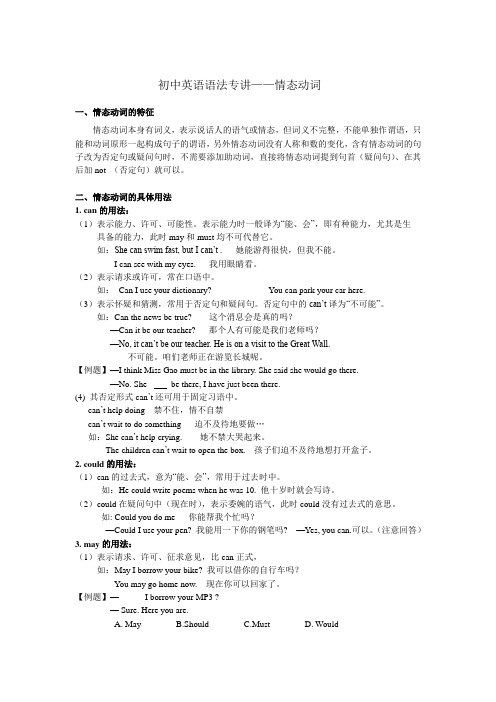
初中英语语法专讲——情态动词一、情态动词的特征情态动词本身有词义,表示说话人的语气或情态,但词义不完整,不能单独作谓语,只能和动词原形一起构成句子的谓语,另外情态动词没有人称和数的变化,含有情态动词的句子改为否定句或疑问句时,不需要添加助动词,直接将情态动词提到句首(疑问句)、在其后加not (否定句)就可以。
二、情态动词的具体用法1. can的用法:(1)表示能力、许可、可能性。
表示能力时一般译为“能、会”,即有种能力,尤其是生具备的能力,此时may和must均不可代替它。
如:She can swim fast, but I can’t . 她能游得很快,但我不能。
I can see with my eyes. 我用眼睛看。
(2)表示请求或许可,常在口语中。
如:Can I use your dictionary? You can park your car here.(3)表示怀疑和猜测,常用于否定句和疑问句。
否定句中的can’t译为“不可能”。
如:Can the news be true? 这个消息会是真的吗?—Can it be our teacher? 那个人有可能是我们老师吗?—No, it can’t be our teacher. He is on a visit to the Great Wall.不可能。
咱们老师正在游览长城呢。
【例题】—I think Miss Gao must be in the library. She said she would go there.—No. She _ _be there, I have just been there.(4) 其否定形式can’t还可用于固定习语中。
can’t help doing 禁不住,情不自禁can’t wait to do something 迫不及待地要做…如:She can’t help crying. 她不禁大哭起来。
情态动词

情态动词1、常见的情态动词有:might、may、could、can、should、ought to、need、would、will、must、shall、dare、used to2、情态动词中有时态变化的有:can-could、may-might、will-would注意:dare和need作为情态动词时是没有时态区分的,只有在作为实义动词时才有事态变化,即dare-dared、need-needed3、情态动词的推测性用法:程度由深到浅排列must>can>could>may>might注意:构成反意疑问句时,问句中不出现情态动词,也不表猜测。
must用于肯定句中can多用于否定句或疑问句中,极少数的情况用于肯定句中,指有理论性的猜测(could的猜测语气更不确定)may只用于肯定句或否定句中(might的语气更加不确定)should表有一定事实依据的猜测。
推测性用法的基本结构:情态动词+V:对现在情况的猜测情态动词+be + Ving:对现在正在进行的动作的猜测情态动词+have done:对过去动作的猜测情态动词+have been Ving:对过去正在进行的动作的猜测情态动词+be+certain to/be sure to+V:对将来的动作的猜测4、情态动词的询问性用法:有这种用法的情态动词有:can、could、may、might、will、shall,其中may比can要正式一些,过去式的情态动词要比它对应的情态动词原形语气要更加委婉。
can<could用于疑问句中,答语用can而不用could)may<might(否定句中用may not而不用might not)shall 和will用于祈使句中。
5、单个情态动词的用法细分:must:1)、表主观义务以及必要性,多用于肯定句或疑问句中。
其答语肯定的用must或have to,否定的用needn’t或don’t have to;2)?表肯定的猜测have to:表客观的需要或义务,译为“不得不”,否定为don’t have to ,相当于needn’t,其形式随主语的人称形式变化而变化,一般可与have got to换用can:1)、表体力或脑力的先天能力;2)、表说话时的猜测语气,指事物的可能性,一般只用于否定句(表must的否定)或疑问句;3)、口语中表请求或允许could:1)、泛指过去的能力;2)、可替代can 表示请求或允许(语气更加委婉);3)、could 与完成时连用表“本….而实际….”may:1)、表情球或允许,比can正式,回答时否定的用mustn’t(不可以)或may not(可以不做);2)、表猜测,通常只用于肯定句或否定句中(might的语气更加不肯定),无时态含义,只是肯定程度的轻重之分;3)、表祝愿,且语气较为正式,后面接动词原形shall:1)、表将来,用于一、三人称,表请求或征求意见;2)、表命令。
九年级英语情态动词用法

情态动词用法I.情态助动词的特征1)除ought和used以外,其他情态动词后面只能动词原形。
We used to grow beautiful roses.I asked if he would e and repair my television set.2)情态助动词用于第三人称单数现在时的时候,没有词形变化,即其词尾无-s形式:She dare not say what she thinks.II.情态助动词的意义和用法1)can和could的用法1.表示能力或客观可能性,还可以表示请求和允许。
如:Can you finish this work tonight?Man cannot live without air.—Can I go now? — Yes, you can.注意:①could也可表示请求,预期委婉,主要用于疑问句,不可用于肯定句,答语应用can(即could不能用于现在时态的简略答语中)。
如:Could I e to see you tomorrow?Yes, you can. (否定答语可用No, I’m afraid not.)②can表示能力时,还可用be able to代替。
如:I’ll not be able to e this afternoon.2.表示惊异、怀疑、不相信的态度。
(主要用在否定句、疑问句或惊叹句中)Can this be true?How can you be so careless!This cannot be done by him.3.“can(could) + have + 过去分词”的疑问或否定形式表示对过去发生的行为怀疑或不肯定。
如:He cannothave been to that town.Can he have got the book?2) may和might的用法1.表示许可。
表示请求、允许时,might比may的语气更委婉一些,否定回答时要用mustn’t表示“不可以”、“禁止”、“阻止”之意。
九年级英语 情态动词常用的解题技巧
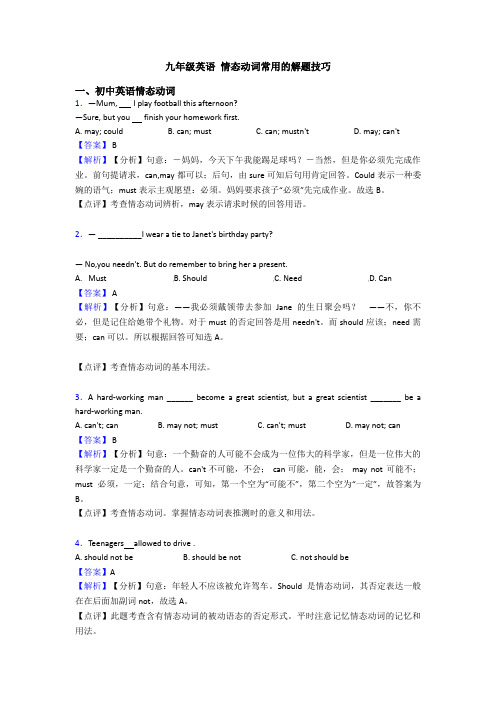
九年级英语情态动词常用的解题技巧一、初中英语情态动词1.—Mum, I play football this afternoon?—Sure, but you finish your homework first.A. may; couldB. can; mustC. can; mustn'tD. may; can't【答案】 B【解析】【分析】句意:-妈妈,今天下午我能踢足球吗?-当然,但是你必须先完成作业。
前句提请求,can,may都可以;后句,由sure可知后句用肯定回答。
Could表示一种委婉的语气;must表示主观愿望:必须。
妈妈要求孩子“必须”先完成作业。
故选B。
【点评】考查情态动词辨析,may表示请求时候的回答用语。
2.— __________I wear a tie to Janet's birthday party?— No,you needn't. But do remember to bring her a present.A. MustB. ShouldC. NeedD. Can【答案】 A【解析】【分析】句意:——我必须戴领带去参加Jane的生日聚会吗?——不,你不必,但是记住给她带个礼物。
对于must的否定回答是用needn't。
而should应该;need需要;can可以。
所以根据回答可知选A。
【点评】考查情态动词的基本用法。
3.A hard-working man ______ become a great scientist, but a great scientist _______ be a hard-working man.A. can't; canB. may not; mustC. can't; mustD. may not; can【答案】 B【解析】【分析】句意:一个勤奋的人可能不会成为一位伟大的科学家,但是一位伟大的科学家一定是一个勤奋的人。
外研版九年级情态动词的定义
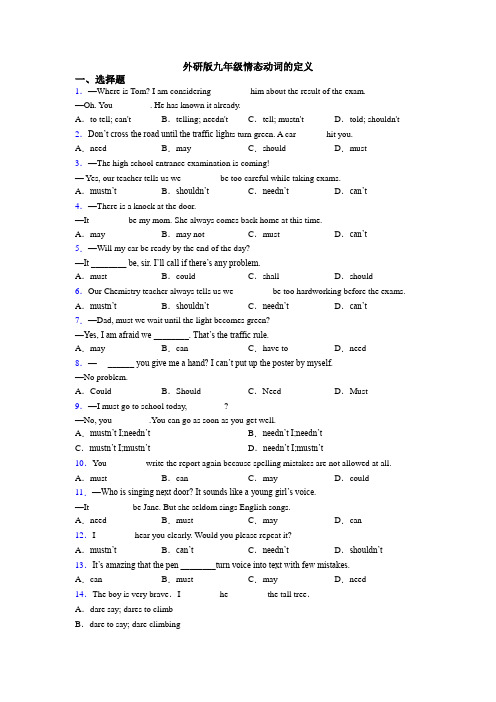
外研版九年级情态动词的定义一、选择题1.—Where is Tom? I am considering ________ him about the result of the exam.—Oh. You ________. He has known it already.A.to tell; can't B.telling; needn't C.tell; mustn't D.told; shouldn't 2.Don’t cross the road until the traffic ligh ts turn green. A car_______hit you.A.need B.may C.should D.must 3.—The high school entrance examination is coming!— Yes, our teacher tells us we ________ be too careful while taking exams.A.mustn’t B.shouldn’t C.needn’t D.can’t 4.—There is a knock at the door.—It ________ be my mom. She always comes back home at this time.A.may B.may not C.must D.can’t 5.—Will my car be ready by the end of the day?—It ________ be, sir. I’ll call if there’s any problem.A.must B.could C.shall D.should 6.Our Chemistry teacher always tells us we ________ be too hardworking before the exams. A.mustn’t B.shouldn’t C.needn’t D.can’t 7.—Dad, must we wait until the light becomes green?—Yes, I am afraid we ________. That’s the traffic rule.A.may B.can C.have to D.need8.— ________ you give me a hand? I can’t put up the poster by myself.—No problem.A.Could B.Should C.Need D.Must9.—I must go to school today, ________?—No, you ________.You can go as soon as you get well.A.mustn’t I;needn’t B.needn’t I;needn’tC.mustn’t I;mustn’t D.needn’t I;mustn’t10.You ________ write the report again because spelling mistakes are not allowed at all. A.must B.can C.may D.could 11.—Who is singing next door? It sounds like a young girl’s voice.—It _________ be Jane. But she seldom sings English songs.A.need B.must C.may D.can12.I ________ hear you clearly. Would you please repeat it?A.mustn’t B.can’t C.needn’t D.shouldn’t 13.It’s amazing that the pen ________turn voice into text with few mistakes.A.can B.must C.may D.need 14.The boy is very brave.I ________ he ________ the tall tree.A.dare say; dares to climbB.dare to say; dare climbingC.dare saying; dares climbD.dare to say; dares climbed15.—The high school entrance examination is coming!—Yes, our teacher tells us we _______ be too careful while taking exams.A.mustn't B.shouldn't C.needn't D.can't16.When I was young, my father ___________ take me to climb the hill which was not far from our house.A.may B.must C.would D.should17.You ______ pay too much attention to your pronunciation, as it is so important in the oral (口头的) test.A.shouldn’t B.mustn’t C.can’t D.needn’t 18.—Ready? Let’s get started, Martin.— Swimming? I just ________ get used to it in winter.A.can’t B.needn’t C.mustn’t D.shouldn’t 19.—Will your mother be at home this Saturday?—Hard to say. She _______go to the countryside to see my grandparents.A.must B.may C.can D.would 20.Exercise is helpful but it ________ be regular (规律的) exercise.A.must B.may C.can D.need21.—How beautiful the winter jasmines (迎春花) are!—Yes. These golden-yellow flowers ________ be widely seen in my city in March.A.must B.can C.would D.should 22.Never throw objects from the building. Even a small object ________ cause serious injuries, or death, when dropped from a great height.A.must B.should C.may D.need23.—In China, many parents complain that their children have to stay up late to do the homework.—Don’t worry. The government has realized the problem. I’m sure there ________ be good news soon.A.can B.should C.need D.must24.— Is the boy over there Tom? He often wears a jacket like that.— It _______ be him. He is absent from school today.A.needn’t B.shouldn’t C.mustn’t D.can’t25.You ________ pay too much attention to protecting yourself if you plan to go abroad. A.mustn’t B.can’t C.shouldn’t D.needn’t 26.When people are waiting at the zebra crossing, cars and buses ________ wait and let them go first.A.must B.may C.can D.need 27.—Excuse me. I haven’t finished reading the book yet. May I keep it a bit longer?— Sorry, you ________. You must return it on time.A.needn’t B.can’t C.won’t D.shouldn’t 28.Cars ________ give way to walkers on some roads in Binhai, or the drivers will be fined. A.may B.will C.can D.must 29.—Must the children leave at six tomorrow morning?—No, they _______. They can have more time to get ready for the trip.A.can’t B.needn’t C.mustn’t D.may not 30.—Could you tell me how to renew the library books?—With pleasure. You ________ come to our desk every time. It’s easier to renew them online. A.can’t B.mustn’t C.n eedn’t D.shouldn’t 31.We've discussed every detail of this plan and have got everything ready. But still something ________ go wrong. We still have to be very careful.A.must B.should C.would D.may 32.—Mum, I bought some strawberries on my way home.—Oh, y ou’re so sweet. But the strawberries ________ be put into the fridge for freshness. A.must B.can C.may D.need 33.—Who’s the man over there? Is that Mr. Black?—It ________ be him. Mr. Black is much taller than that man.A.may B.must C.can’t D.mustn’t 34.—May I have some wine to drink?—No, you ________. You have to drive home later.A.mustn’t B.needn’t C.can’t D.may not 35.—________ I see your ID card? We have to check your personal information.—Sure. Here you are.A.May B.Need C.Should D.Must36.—I don’t care what people think.—Well, you _______ . Some opinions are worth weighing.A.should B.might C.could D.would37.—I think they are enough. We ________ make so many chairs.—I don’t think so. Because nearly a quarter of them need ________.A.don’t need to; mending B.needed; to be mendedC.don’t need; mend D.need; to mend38.You ________ be careful with the camera. It costs!A.can B.will C.should D.may39.—Is it really necessary for me to go shopping with a mask on?—I’m afraid you ________ in public. It is not only to protect yourself but also to protect others. A.must B.should C.can D.need 40.Sometimes smiles ________ be false, hiding other feelings like anger, fear or worry. A.should B.would C.must D.can【参考答案】1.B解析:B【详解】句意:——汤姆在哪里?我正在考虑告诉他考试的结果。
强哥学英语九个情态动词
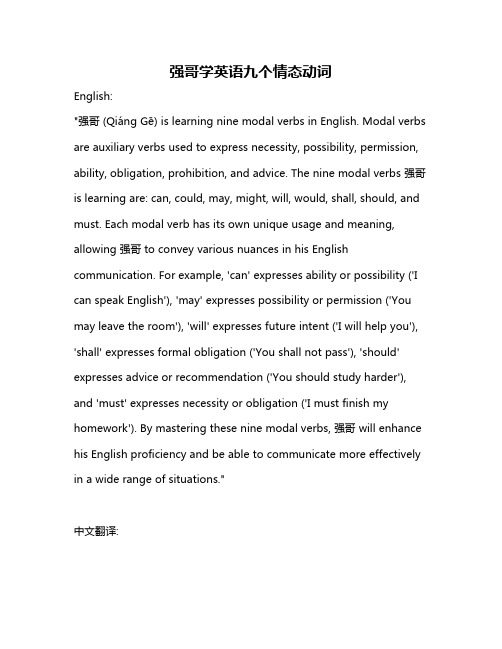
强哥学英语九个情态动词English:"强哥(Qiáng Gē) is learning nine modal verbs in English. Modal verbs are auxiliary verbs used to express necessity, possibility, permission, ability, obligation, prohibition, and advice. The nine modal verbs 强哥is learning are: can, could, may, might, will, would, shall, should, and must. Each modal verb has its own unique usage and meaning, allowing 强哥 to convey various nuances in his English communication. For example, 'can' expresses ability or possibility ('I can speak English'), 'may' expresses possibility or permission ('You may leave the room'), 'will' expresses future intent ('I will help you'), 'shall' expresses formal obligation ('You shall not pass'), 'should' expresses advice or recommendation ('You should study harder'), and 'must' expresses necessity or obligation ('I must finish my homework'). By mastering these nine modal verbs, 强哥 will enhance his English proficiency and be able to communicate more effectively in a wide range of situations."中文翻译:"强哥正在学习英语中的九个情态动词。
- 1、下载文档前请自行甄别文档内容的完整性,平台不提供额外的编辑、内容补充、找答案等附加服务。
- 2、"仅部分预览"的文档,不可在线预览部分如存在完整性等问题,可反馈申请退款(可完整预览的文档不适用该条件!)。
- 3、如文档侵犯您的权益,请联系客服反馈,我们会尽快为您处理(人工客服工作时间:9:00-18:30)。
九情态动词1. —Shall I tell Sally about it?—No, you . I’ve told her already.(安徽)A. shouldn’tB. mustn’tC. needn’tD. can’t2. —__________ you play golf?—No. But I can play table tennis. (北京市)A. CanB. MayC. MustD. Should3. —Hi, Jim, ____you come to my party?—Sorry, I can’t. I have to do my homework. (北京海淀区)A. canB. mayC. needD. must4. --–Mum, ___I play computer games?---Yes, you can. But you have to finish your homework first.(北京)A. mustB. mayC. willD. need5. —What did the head teacher say at the meeting? (福建福州)—He said, “We ______be proud of working hard. We mustn’t be lazy.”A. mustB. needn’tC. mayD. can’t6. ---Let's go dancing tonight.---Sorry, I _____. I have to go to a meeting.(福建南平)A. can'tB. mustn'tC. may notD. needn't7. —Who is the girl standing over there? ---Well, if you know, her name is Joe. (甘肃兰州)A. mustB. mayC. canD. shall8. Yesterday it rained heavily when school was over. We stay in our classroom. (广东汕头)A. shouldB. mustC. had to9. --–Where is mom now?---I’m not sure. She ______ be in the kitchen. (浙江杭州)A. shallB. mayC. needD. must10. ---Listen! Is that Kate playing the piano in the room?---No. It be Kate. She has gone to London. (河北实验区)A. may notB. needn’tC. mustn’tD. can’t11. 一Must I go and do it now?—No,you_ .We still have two more days.(河南)A. shouldn’tB. c an’tC. needn’tD. won’t12. ---What should we do first if we want to develop our village?---A lot of new roads , I think.(黄冈)A. have to buildB. must buildC. have builtD. must be built13. You _________ swim in this part of the lake. It’s not safe. (湖北武汉)A.mustn’t B.needn’t C.won’t14. —Will you please stay here for the party? (同上)—Sorry, I ___. I’ll have to go to an important meeting.A. mustn’tB. needn’tC. can’tD. won’t15. —Why is e-shopping getting more and more popular? (浙江湖州)—It save a lot of trouble and time if it is properly used.A. needB. shouldC. canD. has to16. —Shall we go swimming this afternoon?(湖北仙桃三市)—Sorry, I ________. I have lots of homework to do.A. mustn’tB. needn’tC. may notD. can’t17. —Look! It _____ be Jack on the playground. (湖北孝感)—It _____ be him. Because I saw him enter the school library just now.A. must, mustn’tB. can, can’tC. may, mustn’tD. must, can’t18. ---Must I hand in my exercise book now, Mr. Zhao? ( 江苏连云港)---No, you . You may give it to me tomorrow.A. needn’tB. mustn’tC. c an’tD. may not19. 一Excuse me,is this the right way to No. 1 Middle School? (浙江绍兴)一Sorry,I'm not sure. But it be.A. canB. needC. mustD. may20. — Must I park my car behind the building?— No, you ____. You ____ park it here. (江苏省南通市)A. mustn’t… mayB. may not… mustC. don’t have to…mayD. shou ldn’t… must21. — Can I tell my best friend about it? (江苏省启东中学)—No, I don’t want anyone else to know it. You _______ keep it to yourself.A. mustB. needC. canD. may22. ---May I play computer games, Mum?---No. You wash your clothes, first. (浙江温州)A. wouldB. canC. mustD. will23. —Never touch my computer while I’m away.(江苏泰州)——.A.I shouldn’t B.I mustn’t C.I won’t D. I don’t24. --- Must I finish that work today?--- No, you _____. You may finish it in three days. (徐州市)A. mustn’tB. needn’tC. shouldn’tD. couldn’t25. ---I can’t stop playing computer games.(江西省)---For you health, my boy, I’m afraid you .A. canB. mayC. mustD. have to26. That tall boy _________be John. John is medium height. (辽宁锦州)A. mustn’tB. mustC. can’tD. might27. —Sixteen-year-olds ______to drive. (辽宁沈阳)—I agree. They aren’t serious enough at that age.A. shouldn’t be allowedB. shouldn’t allowC. don’t allowD. are allowed not28. —Whose guitar is this ?—It ______Alice. She plays the guitar. (同上)A. might beB. must beC. can belongD. might belong to29. I enjoy the party very much, but I _________ go home. It’s too dark. (辽宁十一市)A. have toB. mayC. mustn’tD. can’t30. ---Must we collect the waste paper and bottles now?(山东临沂)---____.You can do it after class.A. Yes, you mustB. No, you needn'tC. Yes, you may D, No, you mustn't31. —That T-shirt with Yao Ming’s picture on it belong to David. He admires him a lot.—No, it be his. He hates black color. (山东潍坊)A. can…can’tB. may…needn’tC. must…mustn’tD. must…can’t32. You have already tried your best, so you _________ worry about the matter. (陕西省)A. can'tB. needn'tC. mustn'tD. couldn't33. 一Could I have a look at the photo of your family, Sam? (四川成都市)一Of course you______.A. mayB. canC. could34. We _______ talk loudly when we see the sign on the right. (浙江省)A. mustB. mustn’tC. needD. needn’t情态动词1-5: CAABA 6-10: AACBD 11-15: CDACC 16-20: DDADC 21-25: ACCBD26-30: CADAB 31-34: DBBB。
